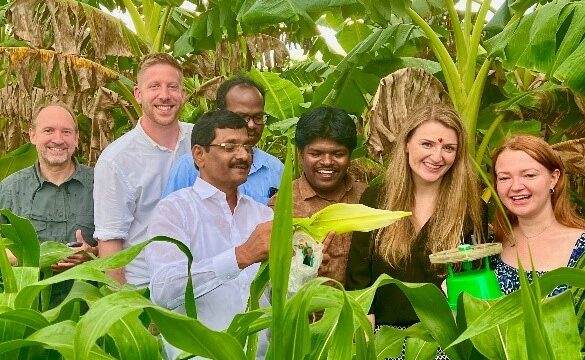
From left: Dr Dennis Rangi (CABI), Dr May-Guri Saethre (IITA), Dr Denis Kyetere (AATF), Dr Rob Bertram (USAID)
Last year, the Fall armyworm destroyed swathes of agricultural production across Africa, devastating maize crops in more than 40 countries and placing at risk the food security and livelihoods of some 300 million people.
The invasion took people the length and breadth of the continent by surprise. Since then, many questions have been asked. Why was the invasion surprising? How prepared are we now? What next? Above all, how can we help smallholder farmers to cope with such catastrophes that may strike at any time?
Dr Dennis Rangi, Director General of CABI, outlined the three-pronged “Defend, Protect, Defeat” approach to managing invasive species that his organisation is recommending at the session on invasive species.
Emphasising some of the challenges involved in such an approach, he didn’t shy away from the difficulties involved. “Often, you’ll have to face a new invasion before you’ve finished dealing with the last,”.
But taking a partnership approach to the challenge is vital. All countries need to develop a strategy and action plan involving government, the private sector, universities, research institutions and NGOs, collectively focusing their response on the areas of greatest risk. And they need to manage their plans across borders with their neighbouring countries and further afield.
As Dr Rangi added, “The World Bank and international agencies must look at this issue in the same way as they do climate change and gender issues.”
Dr. May-Guri Saethre, Deputy Director General, Research for Development at the International Institute of Tropical Agriculture (IITA) pointed out that the technology and knowledge exists that could have prevented this recent outbreak.
“We need to know more about pathways, develop early-warning systems, develop co-ordinated response and eradication, integrated pest and pathogen management,” she said. “Despite most countries having signed agreements, legislation and enforcement is still weak or lacking. A primary aim should be to reduce the day-to-day burden on individual farmers, doing more to enable society to carry the costs involved.”
Dr Denis Kyetere, Executive Director of the African Agriculture Technology Foundation (AATF), gave the audience significant cause for hope. He provided detail of protected maize trials that provide a very high level of protection for crops. And he called for policy-makers to open to all technologies as a sustainable solution is sought. “You also need the right legal environment for such technologies to be considered,” he said.
Dr Rob Bertram, Chief Scientist of the Bureau for Food Security at the US Agency for International Development (USAID) pointed out how the Fall armyworm invasion “reminds us we live in a small world that’s getting smaller. Ironically, I believe the answer is more connectedness, nationally, regionally and globally. We need to showcase how countries deal with endemic pests, and ‘south-south’ learning is increasingly important for learning about threats in tropical and sub-tropical environments.”
Ending, he urged delegates to learn from the Fall armyworm invasion. “A crisis is a terrible thing to waste,” he said.
Dr Patrick Karangwa, Director General of the Rwanda Agriculture Board, called on countries to make agriculture a knowledge-intensive industry. “Fall armyworm is a problem because there has been insufficient investment in knowledge and technology,” he said. And he highlighted how knowledge can drive success: “There was a time when cassava production in Rwanda was decimated. Now, with new varieties, it is very successful.”
The session was completed by Desiree Van Heerden, Development Manager Insecticides at Syngenta. She too called for greater co-operation, sharing technology and knowledge between different countries and sectors, above all ensuring that knowledge reaches farmers working at the grassroots level.
Related News & Blogs
Biological control in action: Zambia’s field days on fighting fall armyworm
Experts from CABI recently held two field days and an expo in Zambia, showcasing innovative approaches to pest management to 584 farmers, agro-dealers and other stakeholders to help raise awareness of approaches to tackle the invasive fall armyworm (Sp…
11 June 2025




